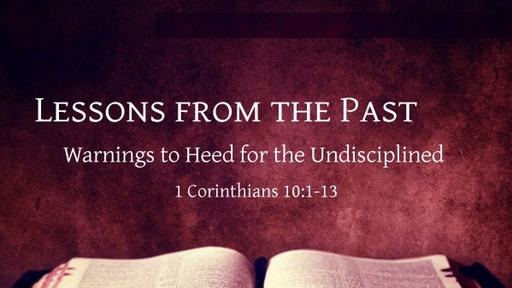Lessons from the Past

Intro:
They thought they were strong enough to freely associate with pagans in their ceremonies and social activities and not be affected morally or spiritually, as long as they did not participate in outright idolatry or immorality.
Paul tells them they were self-deceived. Abusing their liberty not only harmed weaker believers whose consciences were offended but also endangered their own spiritual lives. They could not live long on the far edge of freedom without falling into temptation and then into sin. The mature, loving Christian does not try to stretch his liberty to the extreme, to see how close to evil he can come without being harmed.
I. God’s Actions toward Israel (v. 1-6)
(I)A. His Provisions
The Jews had a popular legend, still known and believed by many in Paul’s day, that the actual rock that Moses struck followed Israel throughout her wilderness travels, providing water wherever they went. I believe the apostle may have been alluding to this legend, saying, “Yes, a rock did follow Israel in the wilderness. But it was not a physical rock that provided merely physical water. It was a spiritual rock, the Messiah (the Hebrew term for Christ) whom you have long awaited, who was with our fathers even then
(I)B. His Reaction
II. Man’s Failure in their Freedom (v. 7-11)
(II)A. Idolatry
(II)B. Sexual Immorality
(II)C. Put the Lord to the Test
Numbers 21 gives the story behind this reference. “And the people spoke against God and Moses, ‘Why have you brought us up out of Egypt to die in the wilderness? For there is no food and no water, and we loathe this miserable food’ ” (Num. 21:5). God had provided manna to eat and water to drink, but the people were not satisfied. They wanted more variety and more spice. They complained and complained, questioning God’s goodness and trying His patience. They had no concern for pleasing God, only for His pleasing themselves. They did not use their new freedom to serve Him better but to demand that He serve them better.
Christians sometimes use their freedom to push God to the limit, trying to see how much they can get out of Him and how much they can get by with before Him. Ananias and Sapphira sold some property to raise money for the church in Jerusalem. Keeping part of the proceeds for themselves was within their freedom and was not sinful. But they decided to appear more generous by claiming they gave the entire amount, and their lying hypocrisy pushed the Lord too far. They not only lied to God’s people but to God Himself. In rebuking them Peter asked Ananias,
Many of the Corinthians were pushing their liberty to the limits, to see how much of the flesh they could indulge and how much of the world they could enjoy. They were trying God and risking severe discipline. As some Christians today, they probably said, “This is the age of grace. We are free and God is forgiving. We can’t lose our salvation so why not get everything out of life that we can?”
(II)D. Grumbling
When God’s people question or complain, they are challenging His wisdom, His grace, His goodness, His love, and His righteousness.
Our need for contentment is not merely for our own well-being, which it is, but for God’s honor and glory. Complaining dishonors our heavenly Father; contentment glorifies Him
